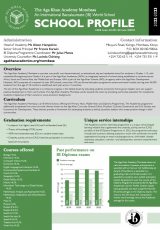Breaking Boundaries in Homa Bay
Samantha Caras (University Counsellor), Ryan Herman (Academy Fellow) and Josephine Awino (DP2) spent their winter break in an unsual way, learning about permaculture, farming, Luo culture and of course, more about each other. They shared some reflections with us about living with a host family and more.
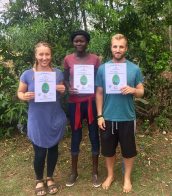 Showing off their permaculture certificates Josephine:
Showing off their permaculture certificates Josephine:
What was your experience in Homa Bay like?
When taking the course, I stayed with two teachers from school and a host family in Rodi who were very welcoming to us. Every morning we went on worked on the farm, digging, planting or weeding. At cooking time, we were allowed to help and most of the time, we ate Luo traditional dishes. As I was able to speak the language, Luo, I found it easier to mingle and interact with the people and the community. I was able to engage with them and understand their lifestyle. I acted as a translator between my teachers and anyone who wanted to speak to them and this proved both fun, but troubling at times.
Living with my teachers in an unfamiliar place wasn’t something my mind had planned for but I automatically adapted to living with the bare minimum. The most awkward part of it was really the first night when I arrived and realized I had to share a living space with two of my teachers. This was fun, but not something I had ever thought would happen. No internet, minimal use of electricity and majority of time spent outside allowed me to interact with the local community and also my teachers to more personal levels. Most afternoons we’d find things to do like going to the local market or going for long nature walks or watching football matches and talking sheep out to graze. This place was peaceful, with everyone welcoming and to me it seemed like a break from the fast-moving world.
My all-time favorite experience was working in the farm every morning. We would wake up to go weeding or replanting or even just creating swales at the farm. The reason this I was my favorite part is because it was the most enjoyable and relatable part of my trip. I also really enjoyed the food served to us.
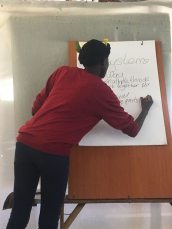 Josephine teaching a class on food systems Thinking about Homa Bay, I guess I’ll always remember the intelligence of the people as well as their willingness to learn more about changing the world and their enthusiasm for agricultural development. The beauty and comfort of the place is one thing that I’ll always cherish.
Josephine teaching a class on food systems Thinking about Homa Bay, I guess I’ll always remember the intelligence of the people as well as their willingness to learn more about changing the world and their enthusiasm for agricultural development. The beauty and comfort of the place is one thing that I’ll always cherish.
The one person that really inspired me was a man who around 75 years old but was part of the student group learning about farming and agriculture. In as much as he was a student, he was also an expert in the area but that didn’t stop him from learning and correcting his mistakes.
Samantha:
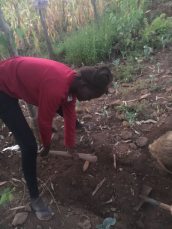 Hard at work digging in the field One of my favorite parts of staying with our host family was dinner time. We would all gather outside to cook over the fire, and then we ate together in our host's mother's house. We started going back to our house (we were 5 in our small house – us three and Abraham and his brother) after dinner to play card games, but we usually ended up in bed before 9. Josephine and I got to know each other very well because we shared a bed/room and because she became my personal bathroom buddy. When it was dark we would have to walk to the out house, dodging cows and sheep, and then hold a light up for each other in order to use the bathroom.
Hard at work digging in the field One of my favorite parts of staying with our host family was dinner time. We would all gather outside to cook over the fire, and then we ate together in our host's mother's house. We started going back to our house (we were 5 in our small house – us three and Abraham and his brother) after dinner to play card games, but we usually ended up in bed before 9. Josephine and I got to know each other very well because we shared a bed/room and because she became my personal bathroom buddy. When it was dark we would have to walk to the out house, dodging cows and sheep, and then hold a light up for each other in order to use the bathroom.
There was so much knowledge in the room. We had people of all ages, from teenagers to men and women in their sixties and seventies, so the sharing of knowledge was really inspiring.
What makes you smile or laugh when you think your time in Homa Bay?
1) The sheep. Ryan and I named all of them, and all three of us would take them on walks to drink water and graze. We learned how to tie them up....and learned which ones were friendly enough to pet!
2) My first time making Ugali and the "dance" that I did as a demonstration.
3) Josephine really amazed me when she taught during the course. She was able to seamlessly flow between different languages, and it was evident that everyone was learning a lot from her. The reactions when she introduced the concept of global warming were very memorable – it was beautiful to see people who love the environment and want to care for it start to have discussions about what they could do on a small scale.
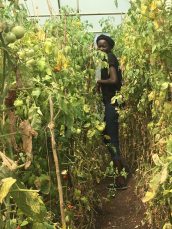 Exploring the greenhouse
Exploring the greenhouse
Ryan:
It is a super rewarding experience to break the barriers of the confined and traditional student-teacher relationship and get to interact with people as people. I did not personally know Josephine before this trip, but I feel very close to her now having both experienced something foreign together. Every night, one of three of us would always have to go use the bathroom after the sun went down. This would mean all three of us would stumble our way across the field to the outhouse in complete darkness and would have to have our eyes peeled because you would always accidentally step on a cow or chicken or poop pile. The family we stayed with was so friendly and very willingly to help us experience parts of Luo culture. One thing I remember so distinctly was sitting down for hours and picking corn of the cob until my thumb started bleeding.
Is there someone you met there who you found particularly inspiring?
I met this really wonderful young man named Kennedy, who I stay in touch with till today, and is currently pursuing this career and attempting to enter the IT field once he graduates.



